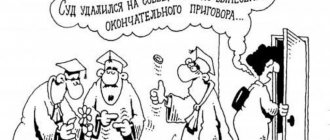Article 327.2 of the Code of Civil Procedure of the Russian Federation. Time limits for consideration of a case in an appellate court (current version)
1. Establishing at the legislative level the terms for consideration of cases in the court of appeal is a guarantee of respecting the right to have a case considered by the court within a reasonable time, preventing delays in the trial and red tape in civil proceedings. The provisions of the commented article determine the various terms for consideration of cases by appellate courts, based, firstly, on the level of the appellate court in the system of courts of general jurisdiction, and secondly, on the special legal regulation of certain categories of civil cases.
The first of these criteria is reflected in parts 1 and 2 of the commented article, which differentiates the terms for consideration of a case on appeal by district courts, supreme courts of republics, regional, regional courts, courts of federal cities, courts of an autonomous region, courts of autonomous districts, district (naval) military courts, the Supreme Court of the Russian Federation. The general rule for all courts of general jurisdiction exercising the powers of appellate consideration of civil cases, with the exception of the Supreme Court of the Russian Federation, is a two-month period for consideration of the case. For the Supreme Court of the Russian Federation, the legislator increased this period by another month, establishing the possibility of considering cases by the Judicial Collegium for Civil Cases of the Supreme Court of the Russian Federation, as well as by the Appellate Collegium of the Supreme Court of the Russian Federation, within three months. The starting point when calculating the deadlines set out in the commented norms is the day the case is received with an appeal or presentation to the appropriate appellate court.
An important point when calculating the time limits for consideration of cases by the court of appeal, which the Plenum of the Supreme Court of the Russian Federation focuses on in paragraph 19 of Resolution No. 13 of June 19, 2012, is the situation when the court of the first or appellate instance receives an appeal, presentation, and a previously received appeal or presentation has already been accepted for proceedings by the appellate court. In this case, the appellate court, if it has information about the receipt of other appeals and presentations, is forced to postpone the hearing of the case and, if necessary, carry out procedural actions provided for in Art. Art. 323 - 325 of the Code of Civil Procedure of the Russian Federation, return the case to the court of first instance, for which an appropriate ruling is made. Postponement of the trial of the case and its return to the court of first instance is the reason for calculating the time limits established by the commented article not from the date of initial receipt of the appeal or presentation by the court, but from the date of receipt of the case with the last appeal or presentation by the court of appeal. At the same time, in order to comply with reasonable deadlines for legal proceedings, the appellate court, when postponing the trial of a case, has the right not to send it to the court of first instance if it establishes that a newly received appeal or presentation was filed within the prescribed period (for example, the appeal was sent by mail and entered the court after the expiration of the appeal period) and meet all the requirements of Art. 322 of the Code of Civil Procedure of the Russian Federation (see commentary to it).
The time limits for consideration of appeals and submissions established by the norms under comment include the time limits for preparing the case for trial and the adoption of a judicial act. The Plenum of the Supreme Court of the Russian Federation, in its Resolution No. 13 of June 19, 2012, draws the attention of the appellate courts to the fact that, regardless of the transition of the appellate court to considering the case according to the rules of a “full” appeal, the period for consideration of the case by the appellate court does not increase, the courts must meet the deadlines established by the legislator in order to respect the right of everyone to have their case considered within a reasonable time. The time period for consideration of the case in the appellate court cannot be extended.
However, based on the analysis of judicial practice, it should be noted that, despite the time limits for consideration of cases in the appellate court clearly stated in the commented article, in practice there are still cases of exceeding the established time limits for consideration, including those that are not justified in any way.
Example: The Moscow City Court recognized that the length of the trial was largely due to the ineffective and insufficient actions of the court in resolving the dispute that arose between the parties and, above all, the actions of the appellate court. As follows from the case materials, the appeal was filed on October 15, 2013, and the appeal ruling on it was adopted on July 8, 2014. From the case materials it is clear that there are no objective reasons why the applicant’s appeal could be scheduled for consideration for so long (only after 9 months), not available. In view of this, the court came to the conclusion that during the specified periods of time the actions of the court to consider the applicant’s case were insufficient and ineffective, which did not allow ensuring the legally guaranteed right to a trial within a reasonable time (see the decision of the Moscow City Court of April 20, 2015 in the case N 3-0227/2015).
2. Based on the position of the legislator, set out in part 3 of the commented article, the time frame for consideration of the case in the court of appeal may differ from those established in the previous provisions of parts 1, 2 of the norm in question, due to the fact that federal laws, including the commented codified normative act, other deadlines for consideration of certain categories of cases in the appellate court may be established. The legislator in the commented norm draws the attention of the law enforcement officer to the fact that such deadlines can only be established by the federal legislator. This position is based on the provisions of paragraph “o” of Art. 71 of the Constitution of the Russian Federation, which relates procedural legislation to the jurisdiction of the Russian Federation.
Currently, the only exception to the general rule regarding the time limits for consideration of cases by the appellate court are the provisions of Part 2 of Art. 244.17 of the Code of Civil Procedure of the Russian Federation, which reduce the period for consideration of a case received on appeal, presentation of a case on the return of a child or on the exercise of rights of access to one month from the date of its receipt by the court of appeal. Other deadlines for consideration of cases on appeal, different from those enshrined in the commented article, are not established by the normative act under consideration and other federal laws.
Shortened deadlines for consideration of appeals and submissions are provided for by federal laws in cases of violation of electoral rights and the right to participate in a referendum of citizens of the Russian Federation, etc. However, at present, in connection with the entry into force of the CAS of the Russian Federation on September 15, 2015, such deadlines are important when considering cases in administrative proceedings. In addition, shortened terms for consideration of cases by the court of appeal are also used in the arbitration process, in particular when considering appeals against a ruling on transferring a case to another arbitration court, a ruling on the return of a statement of claim (statement) and rulings completing proceedings (on termination of proceedings in the case of leaving the statement of claim (application) without consideration (clause 8 of the Resolution of the Plenum of the Supreme Arbitration Court of the Russian Federation of December 25, 2013 No. 99 “On procedural deadlines”).
Comment source:
“COMMENTARY TO CHAPTER 39 “PROCEDINGS IN THE COURT OF APPEALS” OF THE CIVIL PROCEDURE CODE OF THE RUSSIAN FEDERATION OF NOVEMBER 14, 2002 No. 138-FZ”
N.V. Laskina, 2017
What is the time frame after an appeal is made?
Regarding the timing of the production of an AI, there are differences between civil and arbitration proceedings. Art. 327.2 of the Code of Civil Procedure of the Russian Federation establishes the period for consideration of a complaint - 2 months from the date of its receipt by the appellate authority. It follows from this that at least 60 days will pass from the moment of filing until the decision of the appeal is made. To this period should be added the days of sending a document or judicial act between authorities. Since the verdict of the court of appeal is valid from the moment it is accepted, there are no additional deadlines for appeal. The application can be filed the next day after the case returns to the district court.
The rules of the Arbitration Procedure Code of the Russian Federation are no different from the procedure outlined above. It is only regulated by another article - clause 3 of Art. 319. The practice of arbitration lawyers is somewhat different from the practice of civil law lawyers. They submit an application without waiting for the appeal deadline, and the courts satisfy the requirements. The deadline for presenting a writ of execution for execution differs.
Appealing a court decision: instances and deadlines
- leave the decision of the court of the first, appellate or cassation instance unchanged, the cassation appeal, presentation without satisfaction;
- cancel the decision of the court of first, appellate or cassation instance in whole or in part and send the case for a new trial to the appropriate court. When sending a case for a new trial, the court may indicate the need to consider the case before a different composition of judges;
- cancel the decision of the court of first, appellate or cassation instance in whole or in part and leave the application without consideration or terminate the proceedings;
- leave in force one of the court decisions taken in the case;
- cancel or change the decision of the court of the first, appellate or cassation instance and adopt a new court decision, without transferring the case for a new trial, if an error was made in the application and (or) interpretation of substantive law;
- leave a cassation appeal or presentation without consideration on the merits if there are grounds provided for in Article 379.1 of the Code of Civil Procedure of the Russian Federation.
We recommend reading: Personnel records management, journal keeping
How to appeal an appeal ruling of a regional court
Our lives, unfortunately, do not always go the way we want, and sometimes we have to defend our rights in court, or defend ourselves from unfounded complaints of other people.
Of course, no one forbids hiring specialists savvy in legal matters in order to fully defend their rights. But not everyone has the money to pay for a lawyer, and it is useful for everyone to know their rights and obligations in the legal field, at least in general terms.
Presence in an appeal in an arbitration case
The Arbitration Procedural Code regulates the consideration of cases in business disputes. This is mainly the relationship between individual entrepreneurs and legal entities within the framework of their business activities. Such disputes are considered by special arbitration courts (and not by courts of general jurisdiction).
Initially, the rules are the same as in the Civil Procedure Code: the judicial authority must notify the participants; without evidence of receipt of the notification, the court hearing does not begin. Paragraph 2 of Article 156 of the APC says that you can notify the judicial authority of your absence with a request to consider the case without you (representatives are sent from organizations, but you should always proceed from whether it was possible to send a replacement). If the non-appearing party subsequently claims that they did not receive proper notice, the judgment will be set aside.
The failure of the parties to appear is a reason to consider the case in their absence without giving valid reasons. This is the main difference from production within the framework of the Civil Procedure Code. The fact is that arbitration proceedings presuppose greater freedom and voluntariness than civil ones. The question is always about the material benefit of one side or another in the dispute, therefore, roughly speaking, it is their business whether to appear or not.
All these rules, by analogy with the law, apply to review on appeal. If you want, you pass, and the judge checks the decision without you. Only you can decide how satisfied you are with this outcome. Although now it is possible to participate in the meeting remotely, according to Article 153.1 of the Arbitration Procedure Code, using video conferencing. To do this, two conditions must coincide: your petition and the technical ability of the judicial authority to ensure such communication. Obstacles: the lack of such an opportunity, as well as the holding of a closed trial.
Presence in a criminal appeal
Criminal proceedings stand apart from other types for obvious reasons. The rules for appearing in court for the review of sentences are established in article 389.12 of the Criminal Procedure Code. According to it, when reviewing such cases, the participation of:
- state prosecutor, prosecutor (except for private prosecution cases initiated at the request of the victim);
- a private prosecutor, if he is the one filing the appeal;
- a defense attorney in some cases - for example, when the accused is under 18 or has a mental disorder due to which he cannot defend his interests on his own (full list in Article 51 of the Code of Criminal Procedure);
- acquitted, convicted or one in whose respect the criminal case was terminated, but only if he himself requests it, or if his presence is considered necessary by the court.
If we are talking about a convicted person who was taken into custody, then he will participate in the meeting physically or by connecting to a video conference. In cases where one of the persons listed above does not appear, the meeting is postponed. If someone outside this list does not come, the meeting is held in their absence.
Thus, failure to appear in an appeal in a civil case without a good reason or without any explanation is not prohibited by law, but it threatens to have the original decision reviewed without your participation. Failure to appear at the review hearing of the arbitration court, in principle, threatens to reconsider the case in your absence, despite the goodness of your reasons. The failure of the former defendant to appear does not entail any consequences for him, except for a fine, if he filed a request to participate and refused to appear, and if the judge considered his presence mandatory.
Sources:
Consequences of failure to appear at the appeal under Resolution of the Plenum of the RF Armed Forces No. 13
Consequences of failure to appear in court under the Civil Procedure Code
Consequences of failure to appear for an appeal when summoned again
Consequences of failure to appear at an appeal in a criminal case
All the trials are lost
Of course, the best thing is not to bring the matter to such a state, but to consult with a lawyer in advance before committing a legally significant action (an action that gives rise to legal consequences). Cases are different. For example, you want to borrow money or are asked to lend you money, you decide to buy or sell some property (an apartment, a summer house, a car, a garage), in a store you are told dubious things about the conditions for the exchange or return of goods, you are involved in an accident ... – yes, anything. In such cases, it is better not to guess about the rules for performing legal actions and possible consequences (which may be quite unexpected and unprofitable for you), but to ask a professional. So, there are many ways to consult with lawyers: call 500-789, send a message in a group in contact or in discussions, write in a form on the website or by corporate email, you can also contact a lawyer of our company directly (all contact information is in your personal profiles). We hope this will save you from legal action.
An appeal is a legal chance to get justice
If a citizen (or legal entity) has missed the deadline for appealing under the law, he has the opportunity to apply to the court with an application to restore the deadline, in which he must indicate valid reasons for such “lateness.” Reasons and circumstances beyond the applicant’s will may be considered valid, for example, serious illness, illiteracy, etc. In addition, the deadline for filing an appeal may be extended if the applicant received copies of the court decision after the deadline for the appeal had expired, as well as if the body of the first instance court did not explain to the applicant the procedure for appealing the decision or was the cause of the violation of the law established deadlines.
Features of the activities of cassation instances
Appeal of the appeal ruling of the regional court
The activity of the cassation body is to check how well-founded and in accordance with the norms of law the conclusions of the servants of the law are in relation to the case in which the applicant is appealing the appeal ruling of the regional court (in this case).
The cassation service has more powers than the appellate authorities, but at the same time their circle is quite limited. In accordance with the cassation ruling, the case can be reviewed, but the employees of the cassation body are not able to cancel the decision of the lower court. This is only possible if there are gross violations of the judicial process.
The Cassation Service does not review the circumstances of cases and court decisions. Its task is to establish the degree of legality and validity of the decisions made by regional judges. Based on the results of a single examination of the content of the complaint, the judge decides either to refuse to consider it or to transfer the complaint to the Presidium of the court, where it is usually satisfied.
But a positive result is very rare, since cassation appeals are accepted for consideration in isolated cases. A peculiarity of the activities of cassation instances is that they study incoming complaints at their own discretion, that is, they select only a few copies from several dozen.
The review is often carried out behind closed doors, and not at all at a court hearing. In this regard, no one can cancel the possibility of a formal approach to the matter. That is why the efficiency of cassation services is so low.








